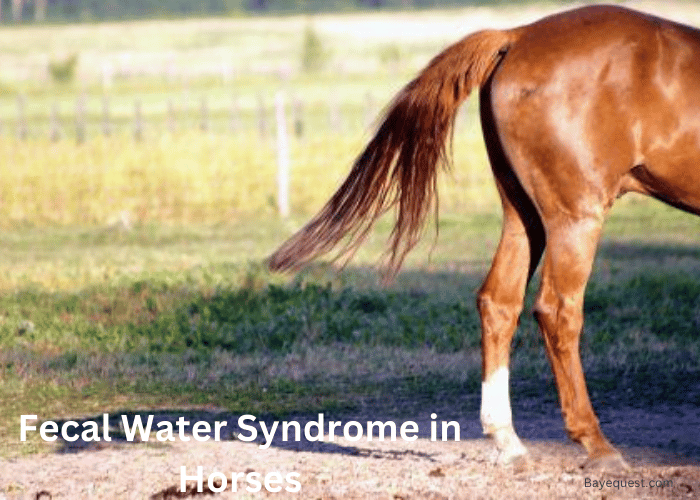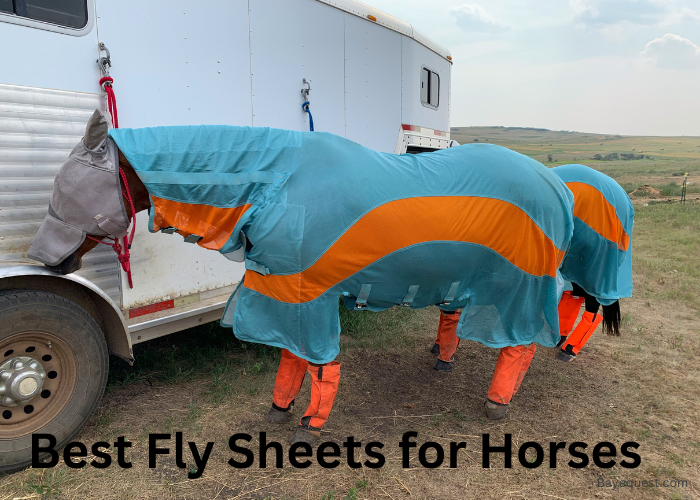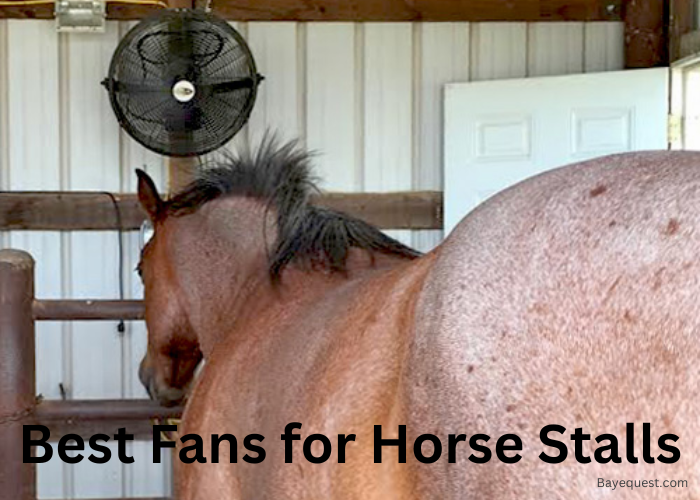Horses can be unpredictable, but Fecal Water Syndrome is a challenge no one wants.
Your horse looks healthy, eats well, and has plenty of energy. Yet, there’s a watery mess staining its legs and tail.
It’s frustrating, confusing, and yes, unpleasant. What’s behind this condition? Is it the diet, stress, or something else?
In this blog, we’ll break it all down. You’ll learn what causes it, the signs to watch for, and how to help your horse feel better.
Let’s get started and solve this messy problem together.
What is Free Fecal Water Syndrome in Horses
Free Fecal Water Syndrome in horses is when your horse passes normal manure, but there’s extra liquid that comes out separately.
It’s not diarrhea, and it’s not exactly a sickness you can pin down. One minute, your horse looks fine; the next, there’s water running down its legs.
It’s frustrating because the manure itself is normal, but the free water is just there, making a mess.
It’s often tied to diet, stress, or gut health, but figuring out why it’s happening can be tricky.
That’s the gist of Free Fecal Water Syndrome—it’s messy, but manageable.
Common Symptoms of Free Fecal Water Syndrome in Horses
Spotting Free Fecal Water Syndrome isn’t too hard once you know what to look for. The most obvious sign?
Watery feces staining your horse’s legs, tail, or bedding. You’ll notice normal manure, but there’s that extra water that just won’t stay put.
Your horse might seem uncomfortable, swishing its tail more than usual or shifting around. You could also spot some weight loss or a dull coat over time if it goes on too long.
It’s not just the mess; it’s the small changes in behavior that tell you something’s off. Keep an eye out for these signs—they’re the telltale clues.
Risk Factors of Fecal Water Syndrome in Horses
The key risk factors of FWS are:
1. Age
Older horses are more prone to digestive issues, including Fecal Water Syndrome. As horses age, their digestive efficiency declines, making them more susceptible to gut imbalances.
2. Breed predisposition
Some breeds, particularly those with sensitive guts like Thoroughbreds, might be at higher risk of developing FWS. Certain genetic factors can make some horses more prone to digestive upsets.
3. High-stress environments
Horses that are frequently transported, compete regularly, or are exposed to constant changes in their environment are at a higher risk. Stress doesn’t directly cause FWS, but it disrupts gut function, increasing susceptibility.
4. Inadequate hydration
Horses that don’t drink enough water, especially in hot weather or during heavy work, are at higher risk. Dehydration can affect how the gut processes feed, leading to FWS.
Find out how much water horses should drink in our other post.
5. Management practices
Horses kept in environments with inconsistent feeding times, poor-quality forage, or overcrowded conditions can be at higher risk. Management practices that disrupt routine can predispose horses to FWS.
6. Previous digestive issues
Horses with a history of colic, ulcers, or other gastrointestinal problems are at an increased risk of developing FWS. Past digestive troubles can leave the gut more vulnerable.
What Causes Free Fecal Water Syndrome in Horses?
The causes of Fecal Water Syndrome (FWS) in horses are varied and often interconnected. Here’s a breakdown of each cause:
Dietary changes
Rapid changes in diet can disrupt the balance of the gut, leading to FWS.
Whether it’s switching to a new type of hay, changing the concentrate feed, or adding new supplements, sudden dietary shifts can shock the digestive system, causing it to pass extra water along with normal manure.
Gut Dysbiosis
This is an imbalance in the gut microbiome—the community of bacteria that aids digestion. Dysbiosis can occur due to poor diet, antibiotic use, or stress.
When the gut flora is off-balance, it can lead to digestive upsets, including FWS, because the gut isn’t processing food as efficiently as it should.
Diet imbalance
A diet that’s low in fiber or too rich in grains and concentrates can upset the natural digestive process in horses.
Horses are meant to eat high-fiber, low-starch diets, and any imbalance—like too much grain or low-quality hay—can lead to issues like FWS.
Forage type
Not all hay is created equal. Low-quality, moldy, or dusty hay can irritate the gut and contribute to FWS.
Even the type of forage matters. For example, too much alfalfa or lush grass can be hard on the digestive system, leading to extra water being passed with the feces.
Inflammation in the gut
Conditions like colitis or other inflammatory gut issues can cause irritation, leading to FWS.
Inflammation disrupts the normal absorption of water in the intestines. This may result in excess water being expelled alongside normal manure.
Poor dentition
Dental issues, such as sharp teeth or missing molars, can affect how well your horse chews its food.
Poor chewing means larger feed particles enter the gut. These larger particles are harder to digest and can upset the balance in the digestive tract, contributing to FWS.
Stress and anxiety
Horses are sensitive animals, and stress can directly impact their gut health.
Factors like travel, changes in routine, new environments, or even changes in companions can cause stress that disrupts digestion, leading to FWS.
Underlying health issues
Gastrointestinal problems such as ulcers, colic, or parasitic infections can predispose a horse to FWS.
These conditions disrupt normal gut function, making it difficult for the horse to maintain healthy digestion and water absorption.
Diagnosis of Fecal Water Syndrome in Horses
Diagnosing Fecal Water Syndrome in horses involves several steps. Here’s a simple breakdown:
1. Veterinary examination
The vet starts with a physical check-up. They look at the horse’s condition, weight, and coat quality. They also ask about the horse’s diet, routine, and any recent changes.
2. Fecal analysis
A sample of the horse’s manure is tested. This helps check for parasites, infections, or gut bacteria issues.
3. Diet and management review
The vet reviews the horse’s diet and feeding habits. They check the quality of hay and any recent changes in the horse’s meals.
4. Blood work
Blood tests help identify hidden health problems. They can show signs of inflammation, infection, or other issues inside the body.
5. Dental examination
The vet checks the horse’s teeth. Dental problems can affect how well the horse chews its food, leading to gut issues.
6. Ultrasound or endoscopy
These tools help look inside the gut. They check for any abnormalities or inflammation that might be causing the problem.
7. Exclusion of other conditions
The vet rules out other conditions like colic or diarrhea. This helps confirm that FWS is the main issue.
8. Response to changes
Sometimes, vets suggest changes in diet or management to see if the symptoms improve. This helps pinpoint the cause of FWS.
How to Treat Fecal Water Syndrome in Horses
Treating Fecal Water Syndrome in horses involves a few key steps to get your horse back on track. Here are some of the methods:
Probiotics and prebiotics
Probiotics add good bacteria to the gut. These bacteria help with digestion and keep things running smoothly.
Prebiotics are like food for these good bacteria, helping them grow and stay active. Together, they restore balance in the gut, reduce inflammation, and improve the horse’s overall digestion.
You can find them in powders, pastes, or added to feed. Regular use can make a noticeable difference in how your horse feels and looks.
Fecal Microbiota Transplantation (FMT)
FMT involves taking healthy fecal matter from a donor horse with a balanced gut. This material is then introduced into the gut of the affected horse.
It sounds unusual, but it’s like a gut reset button. The healthy bacteria from the donor help to restore normal function in the affected horse’s digestive system.
This method is often used when other treatments don’t work, and it can be a powerful tool for stubborn cases of FWS.
Dietary changes
Feeding changes are often the first line of treatment. Start by ensuring your horse has access to high-quality forage, like clean, dust-free hay.
Avoid sudden changes in diet; any new feed should be introduced slowly over a week or more. Adding more fiber, like beet pulp or hay pellets, can help stabilize digestion.
Reducing or eliminating grains can also help, as high-starch feeds can upset the gut. The goal is to create a consistent, balanced diet that supports healthy gut function.
Environmental changes
Stress can trigger or worsen FWS, so minimizing stress is key. Keep feeding times consistent and provide a quiet, calm environment for your horse.
Turnout time is important; horses need space to move and graze naturally. Avoid sudden changes, like new stables or companions, without giving the horse time to adjust.
Simple changes, like regular routines and more outdoor time, can help calm the gut and reduce symptoms.
Supplements for Free Fecal Water Syndrome in Horses
Supplements can play a helpful role in managing FFSW in horses by supporting gut health and digestion.
Here are some key supplements that may benefit horses with this condition:
Probiotics
Probiotics are supplements containing live beneficial bacteria. They help maintain a healthy balance of gut flora, which is crucial for proper digestion.
Probiotics can reduce symptoms of FWS by enhancing gut function and supporting the horse’s immune system.
Look for products specifically designed for horses, often in powder or paste form.
Prebiotics
Prebiotics are fibers that feed the good bacteria in the gut. They help probiotics work better and encourage the growth of beneficial bacteria.
Prebiotics can improve gut health over time, reducing the frequency and severity of FWS symptoms. They’re often found in supplements that combine prebiotics and probiotics.
Psyllium Husk
Psyllium is a natural fiber that helps absorb excess water in the gut, making it useful for managing FWS.
It helps form a gel-like substance that stabilizes the digestive process, which can reduce watery feces. Psyllium is often given in pellet or powder form, mixed with the horse’s feed.
Digestive enzymes
Digestive enzymes help break down food more efficiently, making digestion easier for horses with gut issues.
They can assist in reducing digestive discomfort and improve nutrient absorption, which is beneficial for overall gut health and managing FWS.
Electrolytes
Horses with FWS can lose fluids and essential minerals. Electrolyte supplements help replenish these lost nutrients and keep your horse hydrated.
They support muscle function and overall health, especially in horses that lose extra fluids through watery feces.
Activated charcoal
Activated charcoal can help bind toxins in the gut and reduce irritation. It’s used to support overall gut health and can help manage digestive upset.
It’s usually given short-term and under veterinary guidance to avoid disrupting nutrient absorption.
Yeast supplements
Yeast, particularly Saccharomyces cerevisiae, helps support fiber digestion and stabilize the gut environment.
It promotes healthy bacteria growth and can improve feed efficiency, helping to manage symptoms of FWS.
How to Prevent Fecal Water Syndrome
Preventing Fecal Water Syndrome in horses is all about keeping things steady and balanced. Here’s how you can help keep your horse’s gut happy:
1. Keep a consistent diet
Horses thrive on routine. Avoid sudden changes in their feed.
If you need to switch hay or add a new feed, do it slowly over a week or more. This gives the gut time to adjust without causing a shock.
2. Provide high-quality forage
Make sure your horse has access to clean, dust-free hay or pasture. Good-quality forage is the backbone of a healthy gut.
Avoid low-quality, moldy, or overly coarse hay that can irritate the digestive system.
3. Stable feeding routine
Feed your horse at the same times each day. Regular feeding schedules help maintain a balanced gut and reduce the risk of digestive upset. Skipping meals or feeding at odd hours can lead to problems.
4. Reduce stress
A calm horse is a healthy horse. Keep routines steady and avoid sudden changes in the environment.
Make sure your horse has enough turnout time and space to relax and graze. Reduce stress from travel, competition, or changes in stabling.
5. Regular dental check-ups
Dental problems can mess with digestion. Regular dental care ensures your horse chews its food properly, which helps the gut work efficiently.
Sharp points or missing teeth can cause trouble, so don’t skip those check-ups.
6. Hydration is key
Always provide fresh, clean water. Dehydration can worsen FWS, so make sure your horse drinks enough, especially in hot weather or after exercise. Adding a little salt to feed can encourage drinking.
7. Parasite control
Keep up with regular deworming schedules as recommended by your vet. Parasites can cause gut issues and make your horse more prone to FWS. A well-managed parasite control program is essential.
8. Introduce supplements wisely
Use supplements like probiotics or prebiotics if recommended by your vet.
These can help maintain a healthy gut balance, especially during times of stress or dietary changes.
Read also: Ringbone in Horses.
FAQs
Can FWS resolve on its own?
Yes, FWS can sometimes resolve on its own, especially if the trigger is temporary, like a minor change in diet or stress. However, it’s not something you should just ignore. If symptoms persist, it’s best to make dietary adjustments, reduce stress, or consult with a vet to avoid ongoing issues.
How long does it take for dietary changes to show results?
Dietary changes can take anywhere from a few days to a couple of weeks to show results. It all depends on the horse and how sensitive their gut is. Make changes slowly and monitor your horse’s condition. Improvements usually start within a week, but it can take longer for the gut to fully settle.
Is FWS contagious among horses?
No, FWS is not contagious. It’s related to individual factors like diet, stress, and gut health. One horse’s symptoms won’t spread to another just by being in the same area. However, shared stressors or poor feeding practices can affect multiple horses, so managing the environment is still important.
Conclusion
Fecal Water Syndrome can be a messy and frustrating issue, but it’s manageable with the right approach. Keep your horse’s diet consistent, manage stress, and pay attention to gut health.
Small changes can make a big difference. Don’t wait to act—early adjustments and proper care can help prevent things from getting worse.
Remember, each horse is unique, so what works for one may not work for another. Stay patient, keep observing, and work with your vet to find the best solution.
A happy gut means a happy horse, and that’s always worth the effort.








